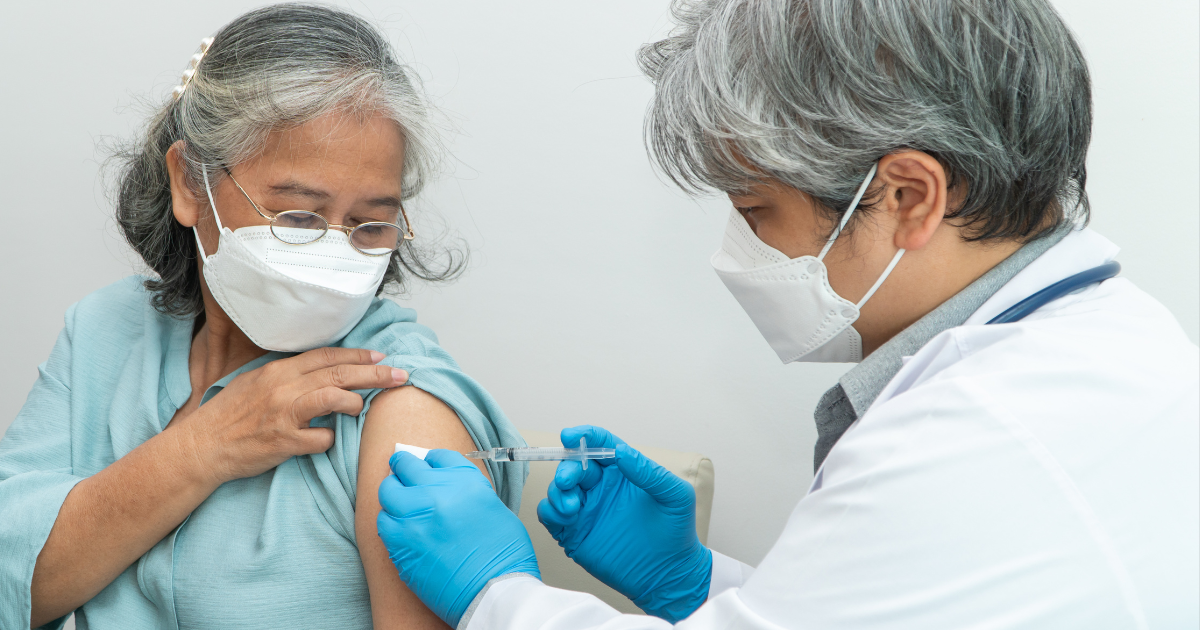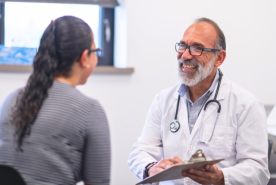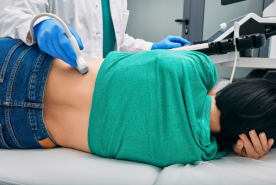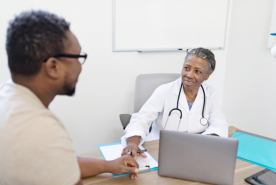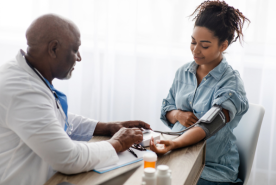August 11, 2022
In March 2020, Patrick Gee, a former dialysis patient and five-year kidney transplant recipient, contracted COVID-19 along with his wife. After difficulties getting diagnosed, both Patrick and his wife became so ill they were hospitalized. Unfortunately, Patrick would also become a COVID long-hauler and continue to experience symptoms.
“I started suffering from chronic fatigue, joint pains, palpitations, dizziness, and lethargy. I couldn't eat and was a ball of confusion," said Patrick, "Now I have good and bad days and am learning how to pace myself."
Patrick, who still experiences brain fog, fatigue, and malaise, knows that COVID-19 remains top of mind for people who are immunocompromised, like himself. Two years have passed since he contracted the virus, and so much has changed. So, he sat down with Dr. Dan Weiner, a nephrologist at Tufts Medical Center and Associate Professor of Medicine at Tufts University School of Medicine, to ask about resources, support, and the latest treatments available to protect yourself as the COVID era continues.
What are the differences between vaccines, antibodies, and boosters?
Antibodies
The immune system uses antibodies to find and remove foreign objects, like the COVID-19 virus. Having antibodies is what protects you against severe infection.
You can get antibodies by being exposed to
- the virus
- a vaccine
- monoclonal antibodies, like Evusheld, or lab-created antibodies that trigger an immune response to kill cells infected with the virus
Currently, the CDC doesn't recommend regular antibody testing in people; however, it could be helpful for those on dialysis and transplant recipients.
"It can give you a good idea of who responded to vaccines, who has a functional immune system, and who's going to get sick if they do get COVID," said Dr. Weiner. "It's really hard to know who is going to have a mild case and who could get seriously sick. The antibody levels do seem to predict who is going to fall into each one of these groups."
Learn more about antibody testing.
Vaccines
Vaccines introduce part of a virus, so the body recognizes it as foreign and makes an antibody for it.
"Vaccines lead to antibodies being present which prevent the virus that causes COVID-19 from taking hold and making you really sick,” said Dr. Weiner. “If you're vaccinated, the risks are much lower. It really emphasizes the importance that people with kidney diseases get vaccinated to protect themselves."
- Viral vector vaccines: Johnson & Johnson and Janssen vaccines are viral vector vaccines. These use a harmless version of a different virus to deliver information to your body's immune system. It does not contain the virus that causes COVID-19, nor can it give the virus to you. This vaccine teaches your body to recognize COVID-19 and know how to fight it off.
- mRNA vaccines: Both Pfizer/BioNTech and Moderna are messenger RNA, or mRNA, vaccines. These teach our cells how to make protein, or a piece of protein, to trigger the production of antibodies to fend off COVID-19.
Learn more about COVID-19 vaccines and kidney disease.
Boosters
Boosters remind the immune system to continue making antibodies against the virus.
"After the two or three-dose vaccine series, people can go get the first booster and a second booster four months after the first," said Dr.Weiner. "The recommendation right now is up to two boosters for anybody with comorbid conditions or is over 50."
Keep up to date with the newest COVID-19 information here.
What happens if I or someone near me tests positive for COVID 19?
First and foremost, don't panic.
"We know vaccines work, especially in people who are vaccinated," said Dr. Weiner. "They don't prevent you from getting COVID but they do prevent the virus that causes it from taking hold and making you very sick. Like any other virus, it can make you feel crummy, but the chances of getting very sick are low."
The next thing to do is notify a healthcare professional, whether a primary care doctor, a kidney social worker, your dialysis center, or your kidney transplant team. They will provide you with concrete next steps and suggestions.
“For people who get COVID-19, there is a good chance you don’t do anything, especially if you're vaccinated and have very minimal symptoms. For people with a transplant or on dialysis, there's a lower threshold for treatment because there's greater vulnerability– even with vaccination," said Dr. Weiner. "For people who are getting dialysis in hemodialysis units, you're notifying them to get treatment for yourself and to prevent spreading COVID to other people."
You’ll also want to continue practicing good hygiene, like washing hands, wearing an N95 mask, and social distancing.
"If somebody lives with you, try to have one person stay downstairs and one person stay upstairs. Have as little contact as possible," said Dr.Weiner. "Outdoors is also a very safe area in terms of avoiding the spread of the virus."
Find regional resources for COVID-19.
Are there treatments for COVID 19?
Getting COVID-19 can be scary, but healthcare professionals will be by your side every step of the process.
"Even if you're only a little sick, you should get further attention because there are options," said Dr.Weiner. "It's worth reaching out to your physician or your care team to see what you can access as an outpatient. That can hopefully prevent you from needing more aggressive or intensive care down the road."
Should you need treatment, there are options available to help stop the viruses from multiplying in the body.
"There are antiviral drugs like Paxlovid and monoclonal antibody therapies that are effective at preventing COVID-19 from becoming severe," said Dr.Weiner. "If you're very sick or having trouble breathing go to the hospital. Other treatments, like high dose steroids, can be offered for serious respiratory illness."
For more information, visit https://combatcovid.hhs.gov/possible-treatment-options-covid-19
How can I best take care of myself with long-COVID?
If you, like Charles, suffer from long-term COVID-19 symptoms, it’s important to know that support is available.
"I think the best thing that somebody can do if they have symptoms consistent with long COVID-19 is to try their best to take care of themselves," said Dr.Weiner. "Stay engaged, try to exercise, move around as much as possible, and find a good diet. The things we advise for anyone with chronic kidney disease would also be true for somebody with symptoms of long COVID."
If you can't work because of COVID-19, you may be eligible for disability benefits. Your social worker can give you information about financial programs, qualifications, and how to apply.
